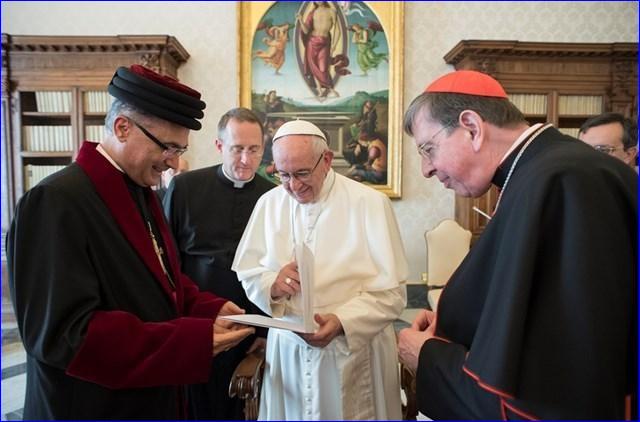


 CNA)
CNA)
Dear Brothers and Sisters, I extend a warm welcome to all of you. I thank you for your visit and Metropolitan Meelis Zaia for his kind words on your behalf. Through you I convey my fraternal greeting in the Lord to His Holiness Mar Gewargis III, recalling with joy our cordial meeting a year ago, which marked a further step on our journey towards deeper growth in mutual solidarity and communion. Our meeting today offers us the opportunity to look with gratitude upon the progress made by the Joint Commission, established following the historic signing of the Common Christological Declaration here in Rome in 1994. After professing the same faith in the mystery of the Incarnation, the Commission planned two phases of dialogue: one on sacramental theology and one on the constitution of the Church. I join you in thanking the Lord for today's signing of the Joint Declaration which brings to a happy conclusion the phase regarding sacramental life. We can now look to the future with even greater confidence and I ask the Lord that your continuing work may help bring about that blessed and long-awaited day when we will have the joy of celebrating, at the same altar, our full communion in Christ's Church. I would like to emphasize one aspect of the new Joint Declaration, where the sign of the cross is referred to as "an explicit symbol of unity among all sacramental celebrations". Some authors of the Assyrian Church of the East have included the sign of the cross among the sacred mysteries, convinced that every sacramental celebration depends precisely on the Pasch of the Lord's death and resurrection. This is a beautiful insight, because the Crucified and Risen One is our salvation and our life. Hope and peace come from his glorious cross, and from the cross flows the unity of the sacred mysteries we celebrate, as well as our own unity, for we were baptized into the same death and resurrection of the Lord (cf. Rom 6:4). When we look at the cross, or make the sign of the cross, we are also invited to remember sacrifices endured in union with Jesus and to remain close to those who today bear a heavy cross upon their shoulders. The Assyrian Church of the East, along with other Churches and many of our brothers and sisters in the region, is afflicted by persecution, and is a witness to brutal acts of violence perpetrated in the name of fundamentalist extremism. Situations of such tragic suffering take root more easily in contexts of great poverty, injustice and social exclusion, largely caused by instability, often fuelled by external interests, and by conflicts that have also led in recent times to situations of dire need, giving rise to real cultural and spiritual deserts, within which it becomes easy to manipulate people and incite them to hatred. Such suffering has recently been exacerbated by the tragedy of the violent earthquake on the border between Iraq, the homeland of your Church, and Iran, where your communities have also long been established, as well as in Syria, Lebanon and India. As a result, particularly during periods of greater suffering and deprivation, large numbers of the faithful have had to leave their lands and emigrate to other countries, thus increasing the diaspora community, with the many trials it faces. Arriving in some societies,

or register to post a comment.